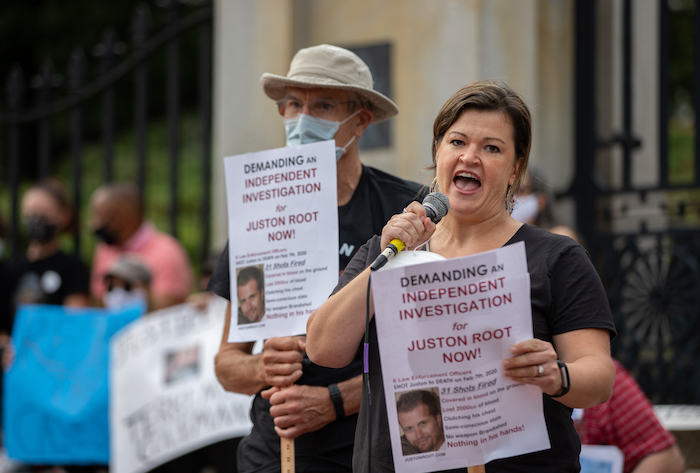By Chris Lisinski
State House News Service
Two Massachusetts men facing years in prison are hoping the state’s highest court will pause their sentences with the COVID-19 pandemic still posing threats six months after it first reached the state.
After mixed rulings in lower courts, Supreme Judicial Court justices heard arguments Wednesday from attorneys representing two convicted men who argued that the unprecedented circumstances warrant keeping them out of custody until the public health crisis subsides.
“Any enclosed congregate environment is not safe during this pandemic. We’ve seen it time and again,” said David Rangaviz, an attorney representing appellant Joseph Elibert. “Most pertinent here, prisons and jails are the sites of 80 percent of the top COVID-19 national hotspots. The risks in prisons are inherent. Of course, steps can be taken to try to mitigate that risk, but it cannot be eliminated.”
Justices considered the two separate cases during one stretch of arguments Wednesday morning, after which they did not indicate when they plan to issue a ruling.
Prisons and jails have been a key area of concern amid the outbreak of the highly infectious coronavirus, with many inmates typically living and interacting in close quarters.
Through Tuesday, 392 Department of Correction inmates had tested positive since the start of the pandemic, the department said Wednesday. Eight died from COVID-related causes, while all others have recovered except for one active case, while 127 DOC staff have cumulatively tested positive.
In county jails, 286 inmates and 200 staff members tested positive through Sept. 2, according to the latest weekly data report required under an April SJC decision. Two inmates in county jails have died as a result of COVID-19.
The scale of the outbreak has slowed in facilities compared to the spring. No deaths have been reported in DOC prisons since May 13, and only two more inmates and eight more staff have tested positive since July 2, according to the department’s data.
The 64-year-old Elibert was convicted in January of indecent assault and battery on a child under 14, and he was sentenced to four to six years in prison.
In April, during the height of the COVID-19 outbreak in Massachusetts, a trial judge temporarily delayed when Elibert would need to begin that term, writing that his medical history with Type II diabetes “makes him at heightened risk of infection and/or injury or death.”
Elibert was released on home confinement with a GPS monitor, but that stay was revoked on June 30 because no one at the MCI Cedar Junction facility had tested positive in the most recent round. Following an appeal, the state’s highest court will now decide where Elibert goes.
Rangaviz, his attorney, argued Wednesday that Cedar Junction reported a positive case in recent weeks, undermining the lower judge’s own reasoning for ordering Elibert to serve his prison sentence.
“Mr. Elibert’s life is at stake,” Rangaviz said. “There’s no basis to return him to custody in the middle of a pandemic to which he’s highly vulnerable when he complied with the conditions of release.”
Arguing on behalf of the state, Assistant District Attorney Erin Knight said Elibert should not remain out of prison, saying that judges should consider the “leaps and bounds” taken by Cedar Junction to improve health safety in the facility.
“Due to his convictions and sentence, the defendant’s baseline is incarceration,” Knight said.
“The commonwealth’s concession that he, as anybody, would be safer at home is hardly groundbreaking, but the defendant stands convicted of indecent assault and battery on a child under 14.”
The other case before the SJC involves Daniel Nash, who was sentenced to serve five to seven years in prison following conviction on two counts of rape, one count of indecent assault and battery on a person over 14 years old and one count of photographing an unsuspecting nude person.
Similarly, a trial court judge agreed to pause Nash’s sentence in May and released him before an appeals court justice reversed that decision, prompting the SJC to step in and weigh the ultimate outcome.
His attorney, Rosemary Scapicchio, argued that the judge who revoked Nash’s stay considered factors outside of those outlined by the SJC for review, such as whether he had any underlying health conditions that create greater COVID-19 risks.
“Even where a defendant can establish a documented health condition and reported cases at his facility, the courts have morphed the requirements even further, apparently requiring new documented cases within hours of the decision,” Scapicchio wrote in a legal brief.
Jennifer Sprague, an assistant district attorney, told justices that the state’s official position supports the lower court ruling that Elibert should no longer have his sentence delayed.
“If your only grounds for the stay is COVID, then that’s a medical issue that should be dealt with with a request for medical parole,” Sprague said.
Advocacy groups and some elected officials fought in the spring for widespread release of inmates whenever possible to reduce populations in prisons and jails, arguing that social distancing would not be possible at current capacities.
On April 3, the SJC ruled that individuals facing nonviolent criminal charges held on bail ahead of trial could petition for release during the pandemic.
Through last week, 1,808 inmates in county jails were released under the provisions outlined by the court, according to the most recent court-ordered data report. At the DOC level, 30 sentenced inmates have been released since the SJC order along with 204 pre-trial detainees and 35 who received medical parole.

